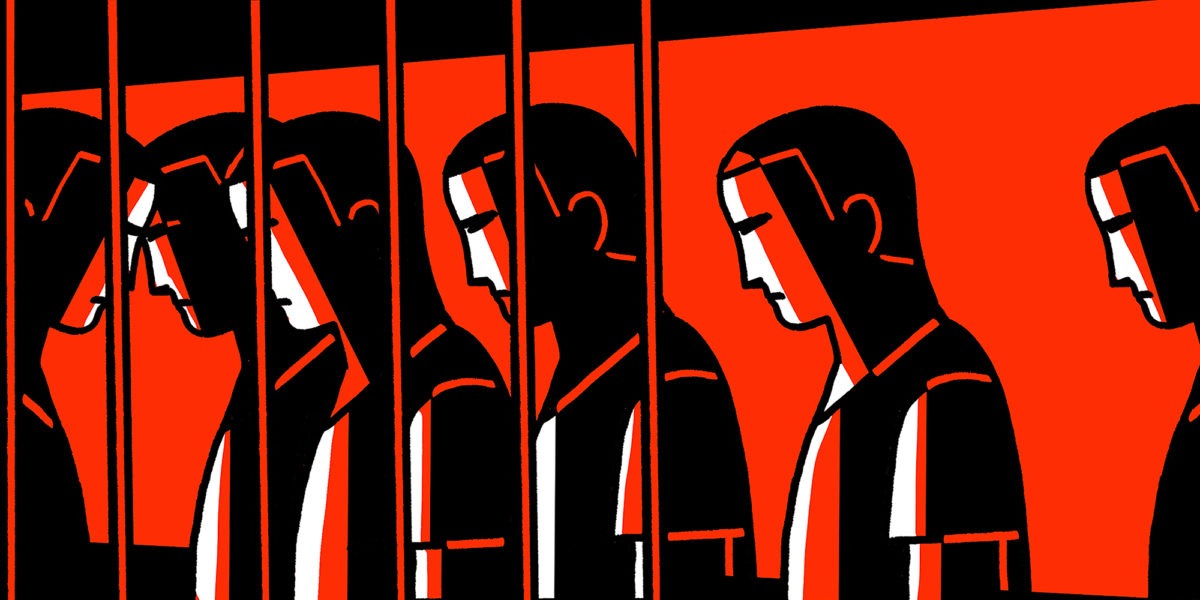In A Florida Courtroom, People Charged With Probation Violations Face Humiliation From Judge
Probation officers in the state’s 13th Judicial Circuit file thousands of violations, and they’re heard by a judge known for his harsh, punitive style.

On Jan. 9, Mia Davis, a 36-year-old Black woman from Tampa, stood in the courtroom of Nick Nazaretian, a judge in Florida’s 13th Judicial Circuit. Her husband Ray sat in the gallery of the Division K courtroom, ready to testify on her behalf. Mia (pronounced Maya) violated the terms of her probation stemming from a February 2019 arrest for battery domestic violence against Ray. Her public defender explained that Mia missed an Oct. 27 appointment with her probation officers because she had been hospitalized during a mental health crisis. “I can only remember that I woke up at the psych ward at Northside [Hospital],” Mia told Nazaretian. “I don’t know how I got there. I believe my husband is the one who placed me there.”
It was Mia’s first probation violation, but a warrant was issued for her arrest. On Nov. 1, police showed up at her home and took her to the Hillsborough County jail, where she was held for two months. Mia, wearing the jail’s orange jumpsuit and with handcuffs chained to her wrists, ticked off a list of her medications from memory: Risperdal, Benadryl, Depakote, BuSpar, Celexa. Ray acknowledged to Nazaretian that Mia had a criminal record that included aggravated assault, resisting police, possessing a weapon, and “throwing a deadly missile”—which Ray later explained was a brick. In Florida, “throwing a deadly missile” is a second-degree felony punishable by up to 15 years in prison, but what constitutes a “deadly missile” has no precise definition in state law. In 1984, an appellate judge in Florida’s Second District ruled that a grapefruit was a missile in the case of a man who threw the fruit at a tanker truck.
Ray told Nazaretian that Mia’s violent incidents occurred when she could not afford her medication. A retired military veteran, Ray told The Appeal that he does not qualify for Veterans Affairs’ Permanent and Total disability benefits, so he and Mia do not have health insurance. Without insurance, Mia’s antipsychotics cost $395 per refill. Ray also explained to the judge that the February 2019 battery domestic assault that initially put her on probation stemmed from a mental health crisis. “When she don’t get on her medication, she hallucinates—starts hearing stuff. Seeing stuff,” Ray told The Appeal. He said Mia wrapped her legs around his torso and beat him over the head. “It sent me to the hospital,” Ray said. “I don’t have the right to lay a hand on a woman, but I do have the right to defend myself, so instead of me doing something, I called the police.”
Mia was arrested that day. In July, Mia pleaded guilty to charges of battery and domestic violence stemming from the February incident and placed on three years of probation. This meant reporting monthly to a probation officer, performing community service, and completing anger management training.
At the hearing, Ray, who stands at over six feet tall, bent over the microphone to tell the judge that even though he called the police on Mia, he wanted her probation reinstated—not jail. “She’s a different person without her medication,” he said.
“So you’re basing her criminal history, not only in this aspect, but on previous aspects, on lack of medication?” Nazaretian asked Ray.
“I really do believe—” Ray began, before the judge cut him off.
“All right, just wanting to make sure what your viewpoint is. What’s next? What else do you want to tell me?”
Mia’s probation officer spoke up. “I just have one comment,” she said, leaning into the microphone. “I’m not a medical licensed provider or anything like that, but if Ms. Davis is having the problems that she is having, then maybe she needs to seek some kind of inpatient long-term mental health care, as opposed to probation.”
Moments later, prosecutors from the state attorney’s office for the 13th Judicial Circuit declined to recommend a sentence for Mia, instead deferring the decision to Nazaretian. Mia’s public defender cut in quickly before the judge could make a determination: “Again, I’ll request the same thing I requested yesterday, that the jail anger-management program is a solution, without a prison sentence.”
“I appreciate that, but I have to consider the whole ball of wax here,” Nazaretian said. He turned and addressed Mia. He told her that she was clearly a different person than what her criminal record suggested. He acknowledged that “sometimes in the street you become a different person, probably because of mental health issues.” But he said he also had to consider the safety of the residents of Hillsborough County and the state of Florida.
“And considering that, you’ll be sentenced according to the guidelines, which is 24.9 months in Florida state prison,” Nazaretian said. “Once that is over, hopefully you can live your life and be crime free. Have a good day.” The judge banged his gavel.
To Ray, the outcome was devastating. “[Nazaretian] said, ‘Well, I got to lock her up to keep society safe.’ Those were his words. I don’t think it’s safer. I think they didn’t address the problem—because now [she’s] sent to prison. She still has the same problem she has. Now she’s punished for it, but it’s not being addressed. … I just wanted to see her get some help.”
The judge “considered that to be a trial,” Ray said. “But I consider that to be a butchering.”
Mia’s probation hearing in Judge Nazaretian’s courtroom lasted 40 minutes, an eternity compared to other hearings where a determination is made in a matter of minutes. Like many probation courts nationwide, probation court in Hillsborough County—which has nearly 1.5 million residents with Tampa as its largest city—moves so quickly because people are encouraged by their attorneys to waive their right to a hearing. Here, the standard is not a presumption of innocence but the much lower threshold of “preponderance of evidence.” “What this means is, if the judge thinks you did it, you’re done,” Dirk Weed, a defense attorney in Tampa who takes probation violation cases almost daily, told The Appeal. “That’s it. He doesn’t have to justify why he did, as long as there is a possibility that there’s a reason that you violated.”
According to Cecelia Klingele, an associate professor at the University of Wisconsin Law School who focuses on probation revocation, the lower standard comes from the idea that probation is a privilege because it is an alternative to custody. Indeed, Nazaretian has described his decisions as “gifts.” “That was a gift from me to you,” he told one person. “It may not seem like that, but how I operate, it was a gift.”
“Often we talk about probation as an alternative to a sanction,” Klingele told The Appeal. “But it is a sanction. And so it becomes the default noncustodial option—if you don’t go to jail, you’re always going to get probation. And we send people into probation who do not need to be on probation at all.” Because probation is viewed as a lesser punishment, she said, it’s easy to underestimate just how punitive it actually is. “You have this contingent liability hanging over [you]. All minor infractions, including noncriminal, can snowball into revocation.”
In other circuits in Florida, any new probation violation, whether technical or from a new felony, puts people back in front of the judge who initially tried them. But in the 13th Judicial Circuit, technical—generally noncriminal—violation cases are heard only by one judge: Nazaretian, who takes cases Monday through Thursday from 9 a.m. until around 4 p.m. “He’s a character to a certain extent,” Weed said.
The Appeal watched Nazaretian hear cases from Jan. 6 to Jan. 9. In that time, the judge asked a defendant if “they had a brain” and if he “had any common sense at all in any way, shape, or form.” He brought a woman to tears by musing that she seemed “loaded,” and then threatened to drug test her on the spot, despite her having tested clean during her probationary period. He accused another person of dishonoring his dead mother. He warned someone else who said he had a job in North Tampa, an area with high levels of poverty, to watch out because “you never know who’s around that area.” He told several men that they wouldn’t do well in prison because of their small size. After he asked one man about his weight—“What are you, a buck-fifty?”—and laughed at his response. “He’s done up there,” he told another.
Nazaretian interrupts people appearing before him and says that their stories of life struggles “aren’t going to fly” in his court. He calls them “sneaky sneaks”; incarcerated people who don’t participate in classes are dubbed “TV-watchers.” He corrects grammar and tells people that if he sees them again, they’ll have to “pack their bags” for prison. In an aside directed to the gallery, he said that a man may have broken curfew because he was “trying to get laid.” Nazaretian sometimes demands that defendants write a three-page report on Lake Butler, a small town two and a half hours north of Tampa that is home to a state prison known for its deadly violence. “Beautiful Lake Butler,” he says, raising his eyebrows suggestively. “Know what that is?” When the defendant shakes his head, he chuckles. “Well, you’ll learn all about it.”
Weed said that although “it’s good to have a judge that scares the life out of you,” it’s not always the most effective way to prevent someone from staying out of the criminal legal system. He says some of his clients are so terrified of Nazaretian that they avoid going to court, even when issued a summons. “And then what happens? He’s very difficult on absconders,” Weed said. “So it almost becomes a circle to a certain extent.”
“Based on judicial ethics rules, judges are severely restricted from commenting on matters that are pending with the court,” Mike Moore, the circuit’s public information officer wrote when asked for comment. “However, he [Nazaretian] strongly believes that the Thirteenth Judicial Circuit’s Violation of Probation (VOP) Division provides a meaningful, sometimes therapeutic, resolution to many probation violations.”

In Florida, judges have the discretion to deny issuing a warrant even when alerted to a probation violation. They are also empowered by state law to depart from even the lowest possible sentence if circumstances permit. Still, the state has a long history of punitive probation policy. In 2003, the state Department of Corrections imposed a “zero tolerance” policy, in which every violation, no matter how small, had to be reported to a judge along with a warrant issued for the violator’s arrest. Though the policy was found to overburden courts and was rescinded in 2008, vestiges of it remain. During the proceedings observed in Nazaretian’s court in early January, many people were there simply because they had missed an appointment for a work conflict, one of the minor violations that the rescindment was meant to eliminate. Weed said probation officers in the 13th Circuit still hew to the zero-tolerance policy in spite of its retraction.
Indeed, according to Florida Department of Corrections data, in the last fiscal year alone, probation officers in the 13th Circuit filed 7,969 violations. Although there are four judicial circuits in Florida with higher populations than the 13th, including the 11th (Miami-Dade County), 17th (Broward County), Ninth (Orange and Osceola counties), and Sixth (Pinellas and Pasco counties), the 13th led them all in the number of probation violations, often by substantial margins. Although the 13th presides over 1.3 million fewer people than the 11th, it puts five times as many people into prison for technical violations. With Florida having the 14th-highest incarceration rate and the third-largest prison population in the country, the 13th Circuit disproportionately feeds one of the most incarcerated states in the U.S.
Of Hillsborough’s 7,969 violations, 69 percent did not allege the commission of any new criminal offense. Despite the lack of a new offense, 40 percent of these technical violations resulted in jail or prison time. In addition, according to Florida’s Office of Economic and Demographic Research, imprisonment rates for technical violations statewide fell from 33.7 percent in the 2014-15 fiscal year to 31.9 percent in the 2018-19 fiscal year. The 13th Circuit’s imprisonment rate for such violations remains well above the state average.
According to Kelly Mitchell, executive director of the the University of Minnesota’s Robina Institute of Criminal Law and Criminal Justice, this probation to prison pipeline is partly due to the myriad conditions imposed on people, often with no relation to the reason the person is under supervision. “When conditions are imposed en masse and without being individualized to the needs of the person, they serve as trip wires, and can easily result in probation revocations,” she said. “This is a hidden population. You can’t tell by looking at someone that they are serving time on a probation sentence. But the collateral consequences that these individuals face—difficulty in obtaining employment, housing, access to education—are staggering. People entangled in the criminal justice system are facing other issues—all sorts of other untreated health needs that make it really hard to abide by even a few of the things we’re asking. Too often we think more is better and longer is better when it comes to length instead of stepping back and thinking: what is the big-picture goal?”

On Jan. 31, Mia was sent to the Florida Women’s Reception Center in Ocala, a prison about two hours north of Tampa that has a significant population of women entering the state Department of Corrections. She will most likely be transferred elsewhere to serve the remainder of her sentence. Because of the transient nature of its population, healthcare at the Florida Women’s Reception Center is notoriously poor. In 2015, the state’s Correctional Medical Authority audited the facility and found life-threatening conditions. In a Sept. 22, 2015, email, the Correctional Medical Authority’s executive director wrote that conditions there “require emergency notification” and “immediate attention” from the Department of Corrections.
Because Ray is still in the process of obtaining approval to receive telephone calls from Mia, he communicates with her through letters. He received her first letter recently. “She said she missed me,” he told The Appeal. “She drew a big old heart in the middle of it.” Ray doesn’t know if Mia is getting her medication, only that he was promised that her medical files would be sent with her. “She’s depressed.”
Ray still thinks about Nazaretian’s treatment of Mia in court. He had been waiting for her hearing in the gallery all morning, and he’d noticed the way the judge treated defendants. It made him suspect that Mia wouldn’t be treated any better. “Just because you’re educated … not everybody’s on the same level,” he said. “I can understand what he’s saying, sometimes, but maybe if he was in another setting—but the belittling part. You don’t have to do that.”
